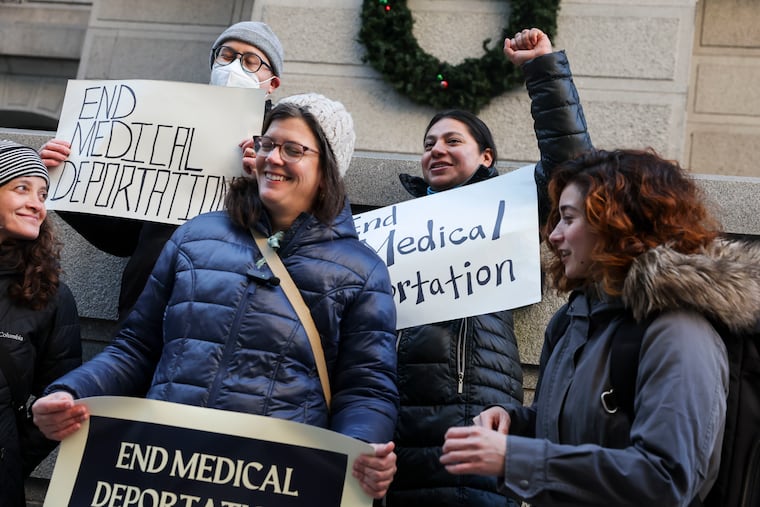Philly City Council votes bars hospitals from carrying out ‘medical deportations’ of undocumented immigrants
Critics call it international patient dumping, an attempt by health systems to avoid the cost of handling people who require long-term care but have no insurance.

Philadelphia City Council enacted what immigration advocates say is a landmark law to stop so-called medical deportations, in which hospitals spirit seriously ill, undocumented patients out of the country to a deeply uncertain future.
Critics call it international patient dumping, an attempt by health systems to avoid the cost of handling people who require long-term care but have no insurance.
The bill passed 14-1 on Thursday at Council’s final session of the year. Mayor Jim Kenney is expected to sign it into law.
“This is going to be something good, not only for the community here in Philadelphia, and in the name of every immigrant here in Philadelphia, but in all the United States,” said Claudia Martinez, the niece of a Guatemalan man, known only as A.V., who suffered a serious brain injury when he was struck by a motorcycle in May 2020.
That June, she and other activists gathered for a planned physical effort to block a vehicle carrying him to the airport from Jefferson Torresdale Hospital. The man was later moved to a long-term care facility in the Philadelphia region.
On Thursday, Martinez gathered with others to celebrate and speak outside City Hall.
“Nobody should go to a hospital and fear that they might be ripped away from their families and flown off to a country where they will be left without access to health care,” said Maripat Pileggi, an attorney with Community Legal Services of Philadelphia, which provides free assistance to low-income residents. “Hospitals are a place for care and healing, not coercion and threat.”
The power to deport rests with the federal government, not with health systems or flight companies. Yet the practice goes on quietly, immigration lawyers say, often without the consent of patients and families.
When an uninsured patient arrives at an emergency room, there is no guarantee that the hospital will provide indefinite care. Meanwhile, long-term care facilities often will not accept uninsured patients.
Hospitals may charter private flights to transport people to their home countries, journeys that often end in the aggravation of illness or in death, immigration advocates said. It’s usually only a matter of time before those patients die because they cannot afford the care they need, according to a study by Jennifer Smith, a professor at the Florida A&M University College of Law.
In some cases, patients and families may decide that the better option is to leave the United States.
Under the new law, patients must give their informed consent to be repatriated after the circumstances have been explained to them orally and in writing — and in a language they understand, if they are not proficient in English.
A hospital must stop efforts toward repatriation if a patient does not consent. Patients who are incompetent cannot consent. The law requires hospitals to explore a patient’s eligibility for emergency health insurance and to produce a written report explaining why removal to another country is appropriate.
Complaints against a hospital will trigger a Health Department investigation.
“I believe that the medical deportation issue is a civil rights issue, and it’s a human rights issue,” at-large Councilmember Jim Harrity said when he introduced the bill in September.
For years, these type of private deportations have been unregulated and ungoverned, most occurring “in the shadows,” concluded a joint study by Seton Hall University School of Law’s Center for Social Justice and the Health Justice Program at New York Lawyers for the Public Interest.
In March, Pennsylvania immigration activists stopped an Allentown hospital from carrying out the forced deportation of an undocumented, comatose patient. The 46-year-old woman, identified only as S.C., experienced complications from surgery after suffering a brain aneurysm in December 2022.
Her supporters said the mother of two could die if she were sent to the Dominican Republic. Her husband, Junior Rivas, 52, said he refused hospital-administration requests to consent to her removal.
A spokesperson for the Lehigh Valley Health Network said at the time that the network could not comment on the woman’s case because of privacy laws, but it “works tirelessly with patients and their families to ensure they receive appropriate care.”
The woman is now under care at a facility in Pennsylvania.
“I’m just really pleased that Philadelphia took a stand on the right side of this issue for immigrants,” said Adrianna Torres-Garcia, deputy director of the Free Migration Project, a Philadelphia-based advocacy group. “They’re not going to get deported because the hospital decides that they have to be deported..”